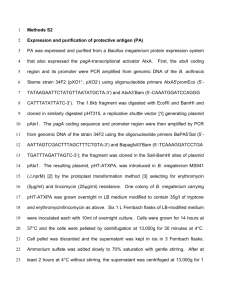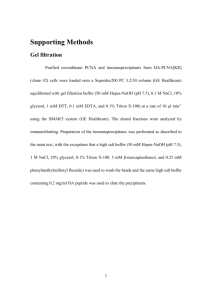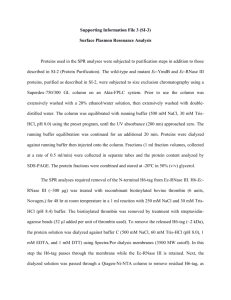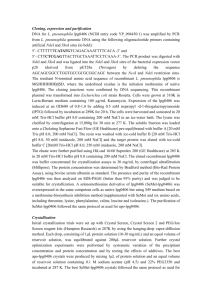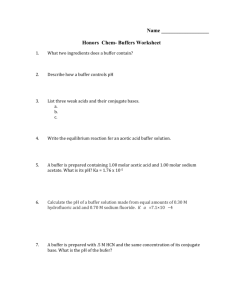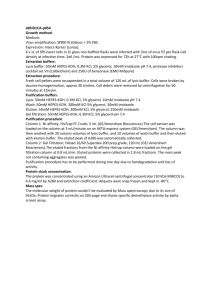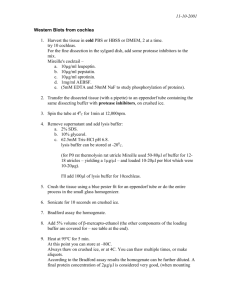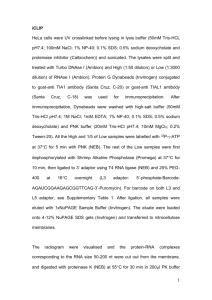Protocols
advertisement
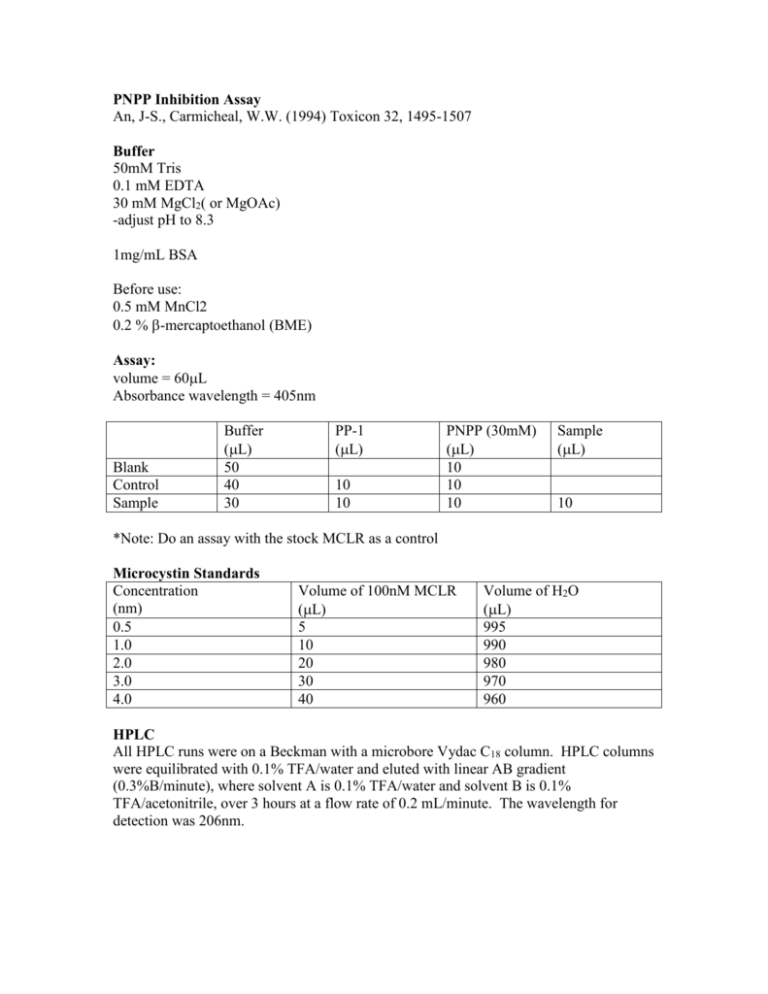
PNPP Inhibition Assay An, J-S., Carmicheal, W.W. (1994) Toxicon 32, 1495-1507 Buffer 50mM Tris 0.1 mM EDTA 30 mM MgCl2( or MgOAc) -adjust pH to 8.3 1mg/mL BSA Before use: 0.5 mM MnCl2 0.2 % -mercaptoethanol (BME) Assay: volume = 60L Absorbance wavelength = 405nm Blank Control Sample Buffer (L) 50 40 30 PP-1 (L) 10 10 PNPP (30mM) (L) 10 10 10 Sample (L) 10 *Note: Do an assay with the stock MCLR as a control Microcystin Standards Concentration (nm) 0.5 1.0 2.0 3.0 4.0 Volume of 100nM MCLR (L) 5 10 20 30 40 Volume of H2O (L) 995 990 980 970 960 HPLC All HPLC runs were on a Beckman with a microbore Vydac C18 column. HPLC columns were equilibrated with 0.1% TFA/water and eluted with linear AB gradient (0.3%B/minute), where solvent A is 0.1% TFA/water and solvent B is 0.1% TFA/acetonitrile, over 3 hours at a flow rate of 0.2 mL/minute. The wavelength for detection was 206nm. Reaction: Microcystin-LR and aminoethanethiol (cysteamine) Moorhead, G., MacKintosh, R.W., Morrice, N., Gallagher, T., MacKintosh, C. (1994) FEBS Letters 356, 46-50 Carry out in Fumehood: For 1mg of MCLR: Use “cow” to purge all solvents with N2 gas -3mL H2O -2mL DMSO -1mL 5N NaOH Prepare 1mg/mL aminoethanethiol (found in fridge, REALLY STINKY! hard to dissolve, will need to vortex) Reaction Vessel (tube) -1.5 mL H2O - 2 mL DMSO -0.67 mL 5N NaOH -1g aminoethanethiol-HCl -1mL of pooled MCLR 78-84B (~0.9mg/mL) -vortex to mix (STINKY!!!) -purge under N2 gas at 52oC for 30 minutes -added 6.5 mL glacial acetic acid -added ~50 mL 0.1% TFA/ H2O -pH to 1.5 with 100% TFA Purification with Sep Pak See Sep-Pak Manual p.15 Elution Protocols: Reverse Phase Chromatography 1. Solvate with 10 mL 0.1% TFA/acetonitrile 2. Flush with 10 mL 0.1% TFA/water 3. Load sample (~60 mL in total) a. collect load (in case it didn’t stick to the column) 4. Wash with 10 mL 0.1% TFA/ 10% acetonitrile 5. Elute with 0.1% TFA/ acetonitrile until you don’t see anything with PNPP inhibition assay (in other words -dry elutions with Speed Vac Reaction: Aminoethanethiol-MCLR and NHS-activated Sepharose Moorhead, G., MacKintosh, R.W., Morrice, N., Gallagher, T., MacKintosh, C. (1994) FEBS Letters 356, 46-50 See Manual Buffers: 50mM NaHCO3 pH 9.2 50mM Tris-HCl pH 8 0.5M NaCl 0.5M NaCl, 50mM NaOAc pH 4 Coupling-Ligand Solution Dissolve Aminoethanethiol-MCLR in 1.0-2.5 mL 50mM NaHCO3 Buffer (in as little volume as possible, my solution was cloudy but I went ahead with the experiment anyways) Removal of Isopropanol -shake bottle and take 6 mL -centrifuge (2500rpm-3000rpm for 5 minutes) -take off supernatant -wash with 10-15 medium volumes of cold 1mM HCl -remove Coupling -add ligand solution -pH to pH 8-9 -incubate end over end for 3-4 hours at room temperature or overnight at 4oC Blocking -centrifuge -remove supernatant, keep aliquot for HPLC -add 50mM Tris-HCl pH 8 for blocking (added up to 10mL total resin and solution) -incubate end over end overnight at 4oC Washing for each wash, add, mix, centrifuge, remove -alternately wash with 50mM Tris pH 8, 0.5M NaCl 50mM NaOAc, and 0.5M NaCl -repeat 5 times -store in 20% ethanol Control (different Sepharose than that used for coupling with MCLR) See manual -measure mass and add 50mM (or high concentration) Tris-HCl pH 8 -incubate end over end overnight at 4oC Binding Experiments -this I made up myself Buffers: “Buffer A” = 50mM Tris-HCl, 0,1mM EDTA, 0.5mM MnCl2, 0.2% betamercaptoethanol, pH 7.5 Buffer A with 0.3M NaCl Buffer A with 3M NaSCN PP1 Solution -I made up solutions of 0.075mg/mL (dilute PP1 with Buffer A) -when I made the solutions too concentrated I seemed to get less efficient binding, maybe the salt concentration was too high? I don’t know. You can play around with it maybe you’ll have better luck than me Resins -I used 50mL of resin (just calculate based on the total volume of the slurry and the volume of resin) -remove the 20% ethanol, wash with water then buffer or with buffer (Marcia mentioned that salts might precipitate in ethanol?) -add the PP1 and incubate for 1 hour -wash with 0.3M NaCl Buffer -elute with 3M NaCl for PP2A Buffer A with okadiac acid (large excess)
